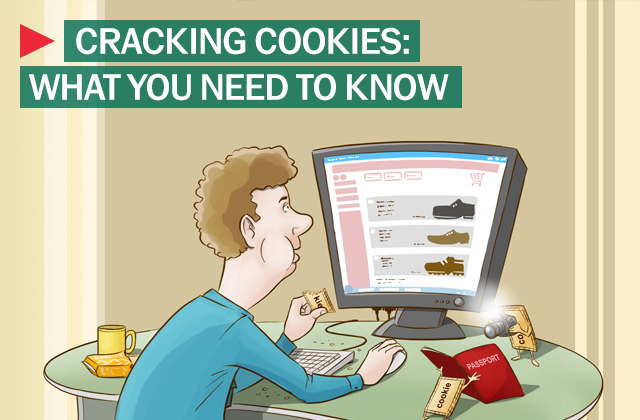Have you ever been browsing the Internet and had a banner ad pop up for a product you’ve previously searched for? When you visit a favorite website, does it have your login information stored for you? Are your online shopping carts flooded with recommendations retailers think you might like? It may seem like the websites you’re visiting know you inside and out, but that’s because, thanks to cookies, they do. And when we say cookies we’re not talking about the sweet treats you indulge in to satisfy a midday sugar craving, we’re talking Internet cookies, or tracking devices that follow your online behavior. Before you continue browsing it might be time to stop and learn exactly what these inedible delights are all about so you know exactly how protected your cyber privacy actually is.
What are cookies?
A cookie is a message or bit of data that a Web server gives to your browser upon visiting a website to store information on your hard drive about your Internet browsing habits. Each time you visit a site that uses cookies, your device sends pieces of information to it so it can remember who you are and create a more tailored user experience for you.
Cookies come in two basic forms, temporary and persistent. Temporary, or session cookies, are cached only for single sessions and are erased when you close out of your browser. Persistent, or permanent cookies, are set for multiple browsing sessions and are erased either when they reach their expiration date or when you delete them. This type of cookie is generally used by sites to modify your browsing experience, like through remembering your user information or knowing which items are in your online shopping cart instead of another person’s. They also allow you to do things like customize your own theme settings in your email dashboard or get local weather updates for your zip code. Amongst these persistent cookies you may also find third-party cookies, which are set up by websites you aren’t presently browsing to track your behavior across other sites. Third-party tracking is commonly used by advertisers to see the websites you visit they’re advertising on, and may also gather information that could be used to create a full profile about your preferences.
The good news is, allowing all of these cookies to access your information gives you a custom-made cyber experiences, but is it safe to be tracked like this?
Are cookies harmful?
There are a lot of conflicting opinions over privacy matters when it comes to cookies. The overall consensus is that in general, they will not harm your computer, but you do need to be aware that since they can collect personal data you could be at risk for things like man in the browser attacks. Back in 2011 the independent Italian security researcher Rosario Valotta found vulnerabilities within Internet Explorer, allowing him to attack the personal data of those who unknowingly shared their cookies with him. Luckily these attacks aren’t overly common and some websites have even begun taking more care in protecting your confidentiality, some going as far as blocking persistent and third party cookies altogether.
Top tips for protection
You do have options when it comes to choosing whether or not you want cookies recording your onscreen habits. Follow these top tips for your best bet at protection.
1. Clear or Remove Your Cookies
You always have the option to delete your browser history and cookies. However, if you don’t want to manually go in and erase your history you can use a system cleaner like PURE to do this for you and even delete your cookies altogether.
2. Adjust Browser Settings
Some browsers, like Firefox and Safari, now offer you more control over which information you want tracked via cookies. To learn your specific options you’ll need to visit the privacy settings for your browser of choice.
3. Use Add-Ons
You also have the choice to use browser add-ons to manage your cookies in a more advanced way. There are a lot of options out there when it comes to choosing one, but if you go this route you will be able to custom modify your cookies, like by choosing the specific ones you’d like to track you and their lifetimes.
4. Share Sparingly
Use sound judgment when it comes to using public computers. Don’t enter any personal information that may be stored by cookies and always ensure you log out of your accounts before stepping away from the screen.
5. Stay Protected
Of course, the ultimate defense against attacks is to make sure you’re fully protected. Having universal security on all of the devices you access the Internet on is your best bet for taking control over your own privacy.
 cookies
cookies


 Tips
Tips